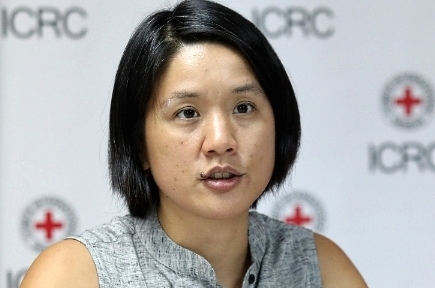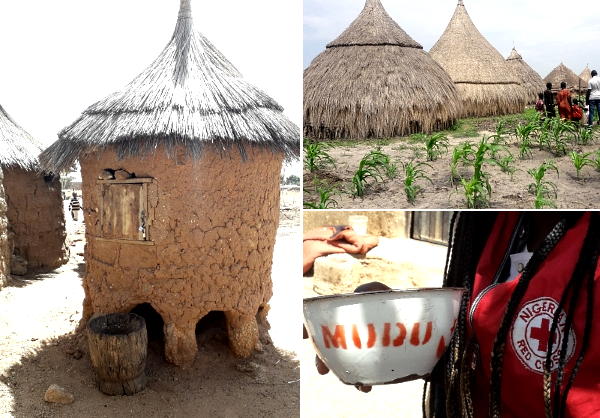August 19 is World Humanitarian Day, a day to pay tribute to life-saving humanitarian workers around the world.
UN statistics show that around 168 million people worldwide, or one in 45, are in dire need of assistance and protection in 2020. This year, the situation is significantly worsened by the coronavirus pandemic.
Despite all the hardships, these unsung heroes and heroines are fearlessly walking into shabby, war-torn areas around the world to safeguard every frail and vulnerable life, International Committee of the Red Cross (ICRC) economic security delegate Ong Cheng Boon being one of them.

Ong has for so many past years been working for NGOs to help the underprivileged and restore their lives as well as communities.
Early this year, after her work in Nairobi came to a close, Ong decided to return to Malaysia for a brief rest before setting off again for South Sudan in August.
Sin Chew Daily was lucky enough to seize the opportunity to talk to her during her stay here.
For the past six years, Ong has been working on numbers, being a part of the logistics team to back up NGOs, interpreting, analyzing and categorizing the data that come to her in order to identify the needs of the people and help the NGOs draw up effective and sustainable assistance programs.
She started working for NGOs since 2014, including the ILO office in Thailand, and doing data analysis for the UNHCR.
She realizes that many established NGOs have massive database that needs specialized personnel to help manage, analyze and digest.
Over the years she has visited Switzerland, Jordan, Yemen, Kenya and South Sudan, helping the local NGOs with her professional knowhow.
She told Sin Chew Daily her ambition at 12 years old was to become a politician.
"If we were not happy with something, I thought as a politician I could improve the condition.
"So I later pursued a course in political studies, which was very different from the choices of average undergraduates."
Initially she followed the "mainstream" trend by taking a course in economics, but later dropped out half way for short of personal interest. She didn't do well in the exams either.
With compromise from her parents, she later went for the course of her liking, political studies, and later proceeded to University of Essex.
Ong discovered many years later that a diploma in political studies was never needed for one to become a politician, and she had no idea what she could do with the degree she obtained.
She later got the opportunity to apply for a scholarship to do a master's course, and went for a course in social policy. From there, she came to learn about analyzing data, study various social policy models and explore their pros and cons.
"I felt that the course indirectly equipped me with a lot of practical skills that would allow me to do more things."
After that, she pursued a doctorate at Maastricht University in the Netherlands.
"Do you know there are white and black schools in the Netherlands?"
White schools are meant for Dutch children while black schools are for non-European migrant children, including those from Turkey, Morocco and Africa.
"Just like in Malaysia we have different language streams. Dutch parents will send their children to schools of their own color, which is a normal thing to do."
During her seven years in the Netherlands, Ong was busily studying various social phenomena and issues in hope of exploring more opportunities to bring about changes to the world. She felt that she needed to walk out of the ivory tower to see the real faces of the world, which prompted her to dedicate herself to NGO works.
She realized later that many consultant firms were urgently needing data analysis experts and had a lot of job opportunities, mostly with NGOs.

"Working for humanitarian organizations is a very 'real' job, one that needs professionalism, not as a volunteer.
"You can survive with the pay, but you can also become accountant, administrative or logistics personnel with the NGOs."
Data analysis is of utmost importance as the information collected, interpreted and analyzed would be used to plan the priority aid solutions.
She cited the example of the earthquake in the Philippines. First and foremost an assessment team had to be sent to the disaster zone to have a better picture of the actual conditions with the help of the Philippine Red Cross or other local NGOs, before interviewing the victims to find out the actual number of victims and the extent of damage to the properties.
"You need to have the numbers before setting a fund-raising target.
"We must first know the use of the numbers in order to collect them."
The duty of humanitarian organizations is not just to salvage the local economy but also prevention, restoration and rebuilding torn communities.
Ong cited the example of the people in South Sudan most of whom are uneducated. They have no idea how much a kilogram is, and are measuring quantities in "pails" instead.
As such, she had to learn beforehand how many kilograms a pail is equivalent to.
"Another problem, people in different areas have different sizes of pails. We need to put together all the information and come up with an average value."
Ong explained that they would not always distribute food and supplies every time, unless the local markets are closed because of turmoil. Normally they would distribute cash to allow the local residents to purchase their daily necessities at the local market.
She said every decision had to be well thought, taking into consideration all the factors and consequences. If all the organizations distribute food and supplies freely to the residents every time, local market business will be affected and many food stalls may have to close down. What about the people's life after the relief organizations have left?
In addition to material assistance, the aid organizations' arrival may also boost the local people's spirit and lift the entire community. For example, the arrival of the Red Cross truck in a war-torn village in South Sudan has given hope to the residents who have fled but are now returning, while markets reopen for business.
Ong said the coronavirus pandemic had further exacerbated the situation, posing very severe challenges to humanitarian missions, with perpetual armed conflicts, virus infections, economic meltdown, collapsed medical system and short supply of cash donations and food. Many fear a much bigger humanitarian disaster is on the way.
ADVERTISEMENT
ADVERTISEMENT


































